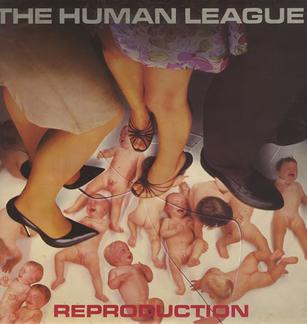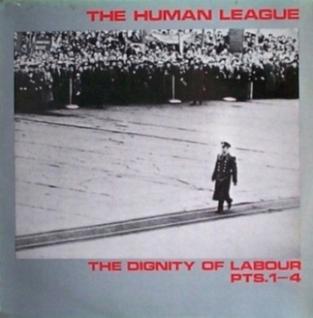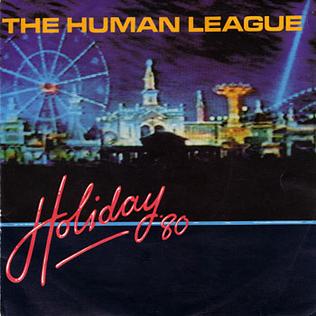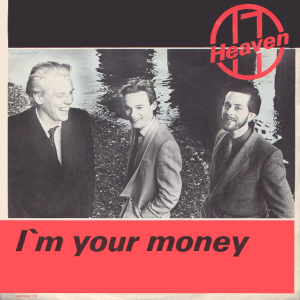
Heaven 17 are an English synth-pop band formed in Sheffield in 1980. The band were a trio for most of their career, composed of former Human League members Martyn Ware and Ian Craig Marsh (keyboards) with vocalist Glenn Gregory.

The Human League is an English synth-pop band formed in Sheffield in 1977. Initially an experimental electronic outfit, the group signed to Virgin Records in 1979 and later attained widespread commercial success with their third album Dare in 1981 after restructuring their lineup. The album contained four hit singles, including the UK/US number one hit "Don't You Want Me". The band received the Brit Award for Best British Breakthrough Act in 1982. Further hits followed throughout the 1980s and into the 1990s, including "Mirror Man", "(Keep Feeling) Fascination", "The Lebanon", "Human" and "Tell Me When".

Travelogue is the second full-length studio album released by British synth-pop group The Human League, released in May 1980. It was the last album with founding members Ian Craig Marsh and Martyn Ware, as they would leave to form Heaven 17 later that year.

Clock DVA are a musical group from Sheffield, England, whose style has touched on industrial, post-punk, and EBM. They formed in 1978 by Adi Newton and Steven "Judd" Turner. Along with contemporaries Heaven 17, Clock DVA's name was inspired by the Russian-influenced Nadsat language of Anthony Burgess's novel A Clockwork Orange. Dva is Russian for "two".

Philip Oakey is an English musician who is the lead singer, songwriter, and co-founder of the synth-pop band the Human League. Aside from the Human League, he has enjoyed an extensive solo music career and has collaborated with numerous other artists and producers.

Dare is the third studio album by English synth-pop band The Human League, first released in the United Kingdom in October 1981 and then subsequently in the US in mid-1982. The album was produced by Martin Rushent and recorded between March and September 1981, following the departure of founding members Martyn Ware and Ian Craig Marsh, and saw the band shift direction from their previous avant-garde electronic style toward a more pop-friendly, commercial sound led by frontman Philip Oakey.

Penthouse and Pavement is the debut studio album by English synth-pop band Heaven 17, released in September 1981 by Virgin Records.

Joanne Catherall is an English singer who is one of two female vocalists in the English synth-pop band The Human League.

The Luxury Gap is the second studio album by English synth-pop band Heaven 17, released on 25 April 1983 by Virgin Records. It is the band's best-selling studio album, peaking at number 4 on the UK Albums Chart – eventually becoming the 17th best-selling album of the year – and being certified platinum by the BPI in 1984.

Reproduction is the debut studio album released by British synth-pop group The Human League. The album was released in 1979 through Virgin Records.

The Dignity of Labour is a 12" vinyl record released in 1979. The tracks were written and performed by The Human League featuring a line-up of Martyn Ware, Ian Craig Marsh and Phil Oakey. It was released as the follow-up to their earlier single "Being Boiled" on Fast Product Records, the label on which the band released their early singles.

"Being Boiled" is the debut single by the British synth-pop band the Human League. Composed by Martyn Ware and Ian Craig Marsh, with lyrics by Philip Oakey, it is regarded as a seminal work in early synth-pop.
Ian Craig Marsh is an English musician and composer. He was a founding member of the electronic band the Human League, writing and playing on their first two albums and several singles, until leaving in 1980 to form the British Electric Foundation and later Heaven 17.

"Boys and Girls" is a song by the British synth-pop group The Human League. It was released as a stand-alone single in the UK in February 1981 and peaked at number 48 in the UK Singles Charts. It was written by lead singer Philip Oakey and the band's visual director / keyboard player Philip Adrian Wright.

"I Don't Depend on You" is a disco-influenced song by the British synth-pop group the Human League released under the pseudonym The Men. It was released as a single in the UK in July 1979, but failed to chart. It was written by Philip Oakey, Martyn Ware and Ian Craig Marsh; was produced by Colin Thurston and featured guest backing vocalists Katie Kissoon and Lisa Strike.

Holiday '80 is an EP released by the original line-up of the British synthpop band The Human League. The EP was issued in the UK by Virgin Records in April 1980, a month before the release of the band's second album Travelogue. The EP peaked at no. 56 in the UK Singles Chart in May 1980, but was later reissued and returned to the chart, peaking at no. 46 in February 1982.

Philip Adrian Wright is an English musician, also known as Adrian Wright.

"Empire State Human" is a song by the British synth-pop group The Human League. The song was written by Philip Oakey, Martyn Ware and Ian Craig Marsh. It was co-produced by The Human League and Colin Thurston, and recorded at Monumental Studios in Sheffield.

Music for Stowaways is the debut album by English electronic act British Electric Foundation (B.E.F.), formed by musicians Martyn Ware and Ian Craig Marsh. The album released in the United Kingdom as a limited edition cassette in March 1981 by Virgin Records, who also released an LP version of the album titled Music for Listening To later in the year with a different track list and cover art, aiming its release for export markets. The Stowaways version was originally released concurrently with Ware and Marsh's first single with Heaven 17, "(We Don't Need This) Fascist Groove Thang", itself a developed version of the Music for Stowaways track "Groove Thang".

"I'm Your Money" is a song by English new wave and synth-pop band Heaven 17, released in 1981 by Virgin as a non-album single. The song was written by band members Ian Craig Marsh, Martyn Ware and Glenn Gregory, and produced by B.E.F..



















